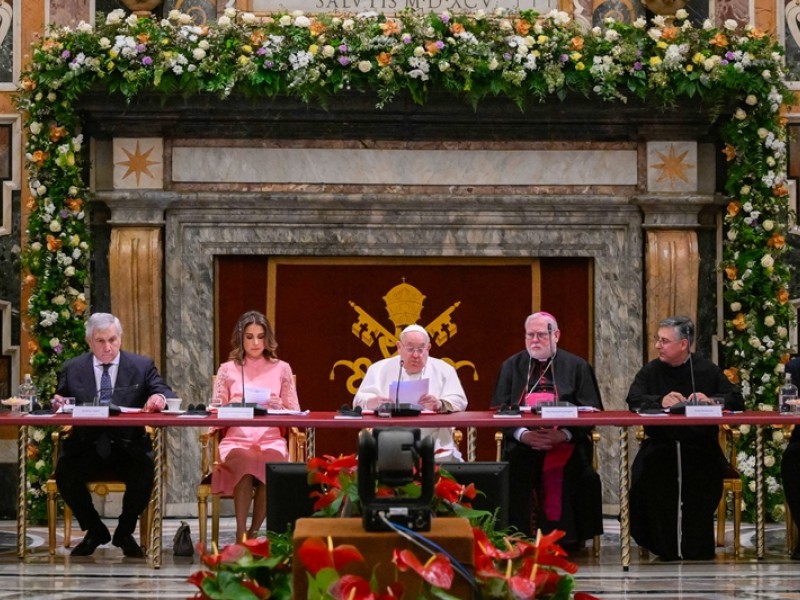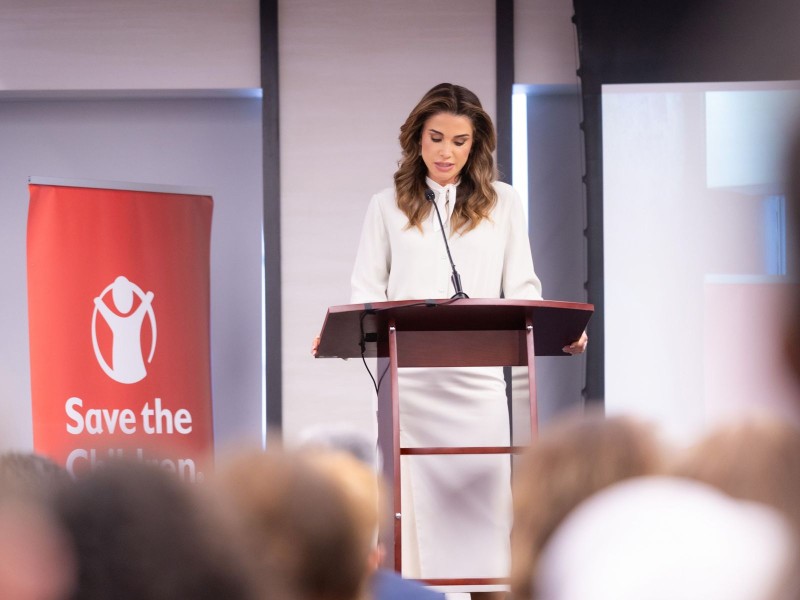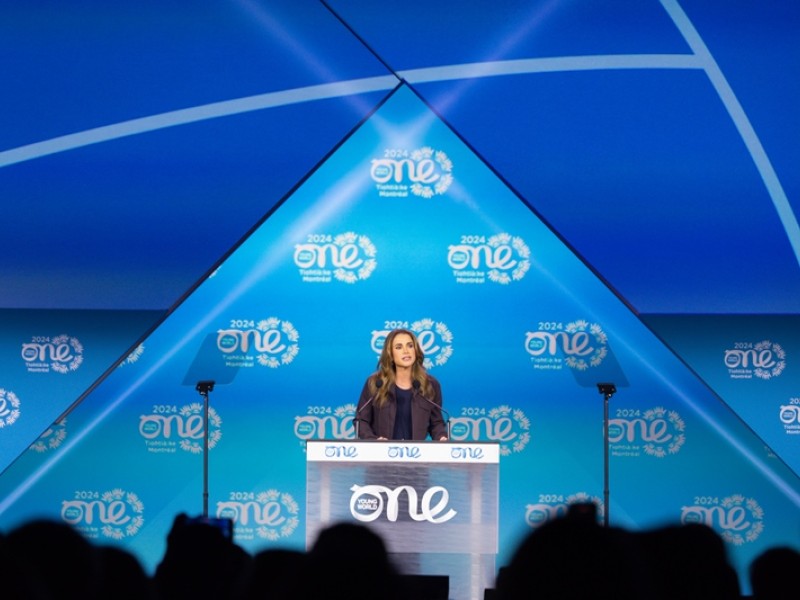Queen Rania's Speech at Global Philanthropy Forum 2005 - Washington DC, USA
Leila’s Lesson
It’s great to be celebrating Earth Day with so many inspiring leaders…so many ambassadors of hope and goodwill in places around the globe.
Thank you, Jane, for inviting me here. I’ve wanted to come for some time.
I’m told this gathering has sometimes been called the “Conference on Borderless Giving.”
But in crucial ways, you are also transcending borders within societies – transforming notions of who can lead, and how we can drive social change.
As Jane, our host, has said so well, each of you has “the agility to invent”– and find new ways not just to meet short-term needs but to plant the seeds of long-term solutions.
So it’s really a pleasure for me to be here, and a privilege as well.
Now, I gather from Bill Gates that at events like these, if you really want to get the audience “buzzing,” you have to bring a jar…
But don’t worry – I’m not about to unleash a swarm of hungry mosquitoes!
I’ve brought a jar of Jordanian apple jam.
And you may wonder why.
Well, it has to do with one of the fundamental questions I know we care deeply about – and that is, “How do we know when philanthropy is making a positive difference?”
I’m here to tell you that part of the answer is Jordanian apple jam.
But I’ll come back to that later.
Because jam may be sweet… but the times we face today are anything but.
The current global economic crisis is wreaking havoc on development.
Oxfam estimates that 100 million more people may be pushed into poverty by the end of this year.
That’s the equivalent of sixteen Jordans… or over 160 Washington DCs.
Worse still, the ones who are suffering most are women, children, and the poorest of the poor.
And the history of past recessions shows that the losses poor people endure are not only in jobs and income levels, but in health and education as well.
Which is doubly cruel. Because when families have to pull their children out of school just to put a crust of bread on the table, it means those children’s futures will be crippled long after the recession has passed.
So the need for global philanthropy is more urgent than ever before.
Yet as you know better than anyone, the crisis has hit you hard as well.
American foundations lost nearly $150 billion in assets last year alone – almost as much as they have given away over the last four years.
Donors are having to make tough choices in the face of overwhelming need… to prioritize where philanthropic dollars will go, among equally worthy causes… and sometimes, being forced to say “No,” even when there’s no one else who can help.
But I think this conference itself is a powerful antidote to tough times.
As the saying goes, when the sky is darkest, that’s when we see the stars.
All of you here – through your commitment and your compassion – are extending lifelines of hope… on issues from refugees to rural development… microfinance to malaria prevention.
And more than that, you’re tilling the soil from which social renewal can bloom.
Over the next three days, you’ll share insights and ideas on a series of difficult challenges that will touch the lives of all our peoples… and no government can solve on its own.
I want to focus on one of those challenges: Education for a globalized world.
And I start from the premise that education is not only a problem but also a solution – because when we look at the obstacles we face, education can help us overcome them all.
When you educate a child, you give her the tools to lift herself out of poverty.
When you educate a mother, you give her the knowledge to protect her health… and raise a strong, healthy family.
When you educate a community, you cultivate a shared appreciation for sustainable development.
And when you educate a country, you encourage greater tolerance, open-mindedness, and peace.
For all these reasons, in my part of the world, education is becoming a top priority.
Across the Arab states, almost 58 million adults are illiterate, two-thirds of them women. Almost 6 million children are not enrolled in primary school, the majority of them girls.
We know too many of our school systems are based on rote learning, instead of creative inquiry. Too many of our children are being told what to know, instead of being taught how to think.
Worse yet, we’re allowing our demographic advantage to pass us by. More than half our region’s population is under 25. Yet we’ve failed to build strong bridges between our schools and the private sector—so that youth unemployment is in double digits, and many of our brightest students move abroad.
Of course, we realize there’s no quick fix for these varied dilemmas.
But we also know we have to begin with educational innovation: revamping our curricula… revitalizing lessons with technology… and reinforcing the link between our classrooms of today and the workplaces of tomorrow.
In Jordan, we’ve taken that task to heart – beginning with our national budget.
We’ve increased enrollment – and I’m proud to say we have as many girls in our classrooms as boys.
We’ve launched new initiatives with the private sector to modernize teaching methods and technology.
We’ve established awards to recognize teachers who set high standards of excellence.
We’re focusing resources on every level – from pre-primary to university.
But the fact is, Jordan is a developing country, and many of our schools are old and tired.
It’s hard to prioritize getting computers into schools where the walls are cracked, the windows broken, and the children must wear coats and hats indoors all winter to try to keep warm.
It’s hard to encourage independent thinking in overcrowded classrooms… with schools so full they must run two shifts… when there’s barely enough teachers for one.
It’s hard to inspire young people to believe in their promise and potential when their facilities are literally falling apart – crumbling, dirty, and dangerous.
It’s hard. We know what needs to be done. But government can’t do it alone.
We need the help of every sector across Jordanian society.
And that is the spirit behind the Madrasati program we launched last year – the idea that quality education is everyone’s responsibility.
In Arabic, Madrasati means “my school.” Its aim is very simple: Bringing people together – from government to business, community leaders, teachers, students, and parents – to renovate and revitalize 500 of Jordan’s neediest schools.
Last summer, we started with the first 100 schools in Amman and Zarqa. Four government departments, four dozen private sector companies, and more than 15 NGO partners have joined in.
The Children’s Museum gives students free access, and curriculum support for their teachers.
One NGO, INJAZ, is teaching young people the skills to compete in the global economy – everything from economics to entrepreneurship to ethics.
Another works with the Royal Health Awareness Society to run school workshops on nutrition and self-care.
Private sector volunteers are tutoring, mentoring, and coaching.
And for every school, we form a committee, including parents and neighborhood leaders, to ensure that the work reflects the priorities of local communities themselves.
Best of all, it’s working!
Which brings me back to where I started: What’s the evidence? How do we know?
At the micro level, the answer lies in a jar of apple jam.
Let me tell you a story.
There’s a 9-year old girl named Leila. She comes from a very disadvantaged neighborhood outside Amman.
Leila is part of the student Madrasati committee in her school.
I mentioned earlier that Madrasati partners run a program we call Healthy Schools.
Through this program, Leila learned that apples were highly nutritious: packed with vitamins, and good for your health too. But she also noticed that the older students were buying and eating chips and chocolate, and throwing away the apples they received in their free school lunches. And some of the younger students were tossing their apples away as well – especially the ones who had lost their front teeth and couldn’t figure out how to eat them!
At about the same time, the Madrasati Committee challenged its members to come up with an idea for a nutritional breakfast. Leila knew her fellow students had a sweet tooth, but she also knew apples were good for them…and that’s how the jam idea came about.
She and a friend decided to collect uneaten apples from their classmates. The first time they did, they gathered almost 2 kilos from table tops and windowsills. Then, together with her mother, she made the apples into an enormous jar of jam, keeping the sugar to a minimum – something else she’d learned from the Healthy Schools’ program. When she brought it into school for breakfast, the students raved about it, coming back for 2nds, 3rds, and 4ths!
With Madrasati’s help, Leila is in the process of getting her jam-making social enterprise approved by the Ministry of Health, no less…because this little girl is dreaming big.
Her goal is to make enough jam to feed the children breakfast every morning, and have enough leftover to sell in the local market. But she’s not stopping there. According to her neatly typed-up, two year business plan, she intends to reinvest her profits back into school and, more specifically, revamp the cafeteria and upgrade the computer lab.
In her words, “My dream is to make my school better and safer, before I leave it, for the other children who will follow me.”
Leila says that before Madrasati, she always saw things that needed to be done, but she had no avenue for taking action. Being on the committee has given her a place to share ideas and to make things happen.
And Leila’s lesson is that philanthropy means so much more than just giving money.
Philanthropy means giving bold thinkers like her the chance to lift their whole community…and to realize the power within themselves to change things for the better.
And when it comes to education, the power of philanthropy can be even bigger… not just within communities and countries but among them… stitching together humanity’s frayed seams, especially at a time of global turmoil.
You know, the best ambassadors for the United States in the Arab world are men and women who have studied in America.
But for those who won’t ever be able to study in this country, you can help build friendships and understanding by investing in education abroad.
And I know that educational reform is a domestic challenge too. I know that fixing America’s schools is a priority for your new president, and the public… and that many of you right here in this room are standing on the front lines – teaching for America… building brighter choices… changing the odds for kids in Harlem and DC… and proving that knowledge is power.
But especially in these tough economic times, we cannot afford to be protectionist – not in our trade… not in our investment… and not in our philanthropy either.
Because after all, education is one of the very best investments we can make.
It’s a chance not just to lift individual lives, but to raise whole generations… a chance not just to brighten futures at home, but to bridge the gaps that divide us around the world.
We can do it.
We can teach our children well… if we only work together.
And one day, a little girl like Leila will grow up to be a person like you… giving back to a global community that saw fit to give something to her.
Thank you very much.
Featured
Queen Rania's official website
This website does not support old browsers. To view this website, Please upgrade your browser to IE 9 or greater
Your browser is out of date. It has known security flaws and may not display all features of this and other websites. Learn how to update your browser



